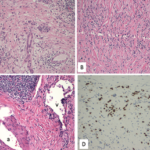Treatment
In Asia, treatment for IgG4-related disease typically involves 40 mg of prednisone daily for one month, followed by a taper to 5–10 mg daily and maintenance of this dose long term, Dr. Stone noted. With this treatment regimen, a high percentage of relapses occur and adverse effects from treatment remain somewhat high.
In North America and Europe, treatment usually involves 40 mg of prednisone daily for one month, followed by tapering of prednisone over 2–3 months. Although similar to the treatment approach in Asia, this regimen, unfortunately, results in frequent disease flares.
Rituximab has been used to treat multiple manifestations of IgG4-related disease, and new treatments are being explored for this patient population. 5 These agents include inebilizumab, an anti-CD19 agent; rilzabrutinib, a Bruton’s tyrosine kinase inhibitor; and elotuzumab, which targets the SLAMF7 pathway.
Many detrimental effects of IgG4-related disease come in the form of accumulated damage, causing endocrine and exocrine pancreatic failure, renal failure, hydronephrosis and the need for chronic ureteral stents, chronic hepatobiliary failure, bone-destructive sinus lesions, orbital lesions or pituitary failure. Thus, the primary goal of treatment is to halt the disease process early in its course to avoid long-term damage.
Although IgG4-related disease has only been defined in the past 20 years, Dr. Stone discussed many advances that have occurred in our understanding and management of this condition. In coming years, rheumatologists hope patients with this disease will be readily identified and treated— and perhaps, a great deal of morbidity and mortality can be prevented.
Jason Liebowitz, MD, completed his fellowship in rheumatology at Johns Hopkins University, Baltimore, where he also earned his medical degree. He is currently in practice with Skylands Medical Group, N.J.
References
- Mikulicz J. Über eine eigenartige symmetrishe Erkrankung der Thränen-und Mundspeicheldrüsen. In: Mikulicz J, editor. Beiträge zur Chirurgie: Festschrift gewidmet Theodor Billroth. Stuttgart: F.Enke; 1892. pp. 610–630. Available at: http://webapp.uibk.ac.at/alo_cat/card.jsp?id=8542696&pos=54&phys=#.
- Perugino CA, Stone JH. IgG4-related disease: An update on pathophysiology and implications for clinical care. Nat Rev Rheumatol. 2020 Dec;16(12):702–714.
- Wallace ZS, Naden RP, Chari S, et al. The 2019 American College of Rheumatology/European League Against Rheumatism classification criteria for IgG4-related disease. Arthritis Rheumatol. 2020 Jan;72(1):7–19.
- Zhang W, Stone JH. Management of IgG4-related disease. Lancet Rheumatol. 2019 Sept;1(1):e55–e65.
- Carruthers MN, Topazian MD, Khosroshahi A, et al. Rituximab for IgG4-related disease: A prospective, open-label trial. Ann Rheum Dis. 2015 Jun;74(6):1171–1177.


